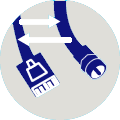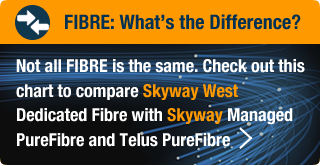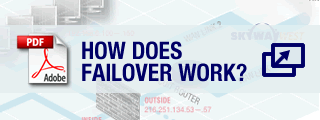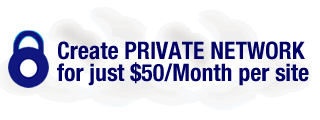Business DSL
Skyway West delivers multi-featured, managed DSL for business, with unlimited data. We focus our expertise on your business Internet requirements, prioritizing DNS, VoIP and RDP traffic on our network.
A Reliable, Managed Broadband Connection:
- each service customized for best performance given line conditions
- 5 permanent public IP addresses and a four port router
- Skyway consults with client to prioritize traffic for optimal Internet experience
- auto alert to your IT department within 6 minutes of service disruption
- experienced, responsive technical support trained for business networks
- plan for future bandwidth requirements with usage graphs
- secure web access to service health measurements: packet loss, latency, etc.
- includes unlimited data traffic
Skyway West offers DSL in a range of speeds up to 150 Mbps Up/25 Mbps Down, depending on your location. All DSL services include Unlimited Traffic. We also offer a low-cost, VoIP-only DSL service.
Get Started by Contacting SalesBest Practice: add Policy Routing & Failover
Add a Cable service and receive Failover and Policy Routing for just $20/month!
DSL INTERNET services include:
- 5 Usable Static IPs transferable between services and locations
- Email Accounts 10 Free, including Spam and Virus protection
- Domain Name Hosting up to 3 domain names
- Control Panel secure web access to monitor network health and manage Domain Names and email accounts. Includes service alerts, usage reports and traffic analysis
- Industry-best Skyway West Support
FAQs All You Need to Know About DSL
Static IP addresses provide a stable connection and permit remote users to access corporate firewalls and servers (e.g., mail, web, ftp, voice over IP).
Static IP addresses make it possible to connect branch offices, home users and remote employees to your LAN. Network administrators can connect to the office servers to maintain them. Remote users can authenticate their access to the office network. Static IP addresses are essential if you host your own mail or web server and also necessary to make an application like a corporate database or accounting program accessible over the Internet.
Additionally, static IP addresses permit Skyway to continually monitor and measure the health of your service and determine if any problems that arise are due to our equipment, your firewall or the cable between them.
Static IP addresses are included with all our services. All Skyway customers may move from one Skyway service to another or from one location to another without changing their IP addresses.
There is more than one kind of Digital Subscriber Line (DSL). Asymmetric Digital Subscriber Line (“DSL”: in general use, the “A” has been dropped in the acronym) is so called because upload and download speeds are not equal; Digital because the technology transforms a regular phone line to a digital connection.
Data is carried on a telephone line consisting of a twisted pair of copper wires. The wires are run from the customer premise to a telephone company Central Office DSLAM (Digital Subscriber Line Access Module), which may be many kilometers away from the customer. Both at the customer’s end and at the Central Office there is equipment that mixes together and splits apart signals based on frequency. The lowest frequencies are called “baseband” and carry traditional POTS (Plain Old Telephone Service) telephone service. Above baseband is placed the upstream channel, and above that at the highest frequencies is placed the downstream channel. At the customer end, the DSL signal is either split off using a device called a POTS Splitter placed between the wall jack and your telephone equipment to split the baseband signal apart from the DSL signals so that one connects to a phone and the other to an DSL modem or router, or the signal is carried over an DSL-only (“dry” or “naked”) copper line.
When a splitter is properly installed, DSL does not interrupt alarm systems, point of sale terminals, fax or phone calls and these services do not affect the quality of DSL.
DSL speeds are measured in Mega Bits Per Second (Mbps). One Mbps is one thousand Kilo Bits Per Second (Kbps). DSL services are distance dependent and are sold in BC and Alberta with download speed bands up to 6, 15 or 25 Mbps. Upload speeds are either 1 or 5 Mbps and are set depending on download service.
Example: DSL Download times (in minutes) for 1GB file
Example: DSL Upload times (in minutes) for 1GB file
A long pair of copper wires is a difficult environment for a radio-frequency signal like DSL. Coax cable of the sort used for Cable TV has little signal loss over distance, and it’s easy to regenerate the signal with amplifiers along the way because each amplifier serves many subscribers at once. But telephone wires will attenuate (weaken) the signal strength quickly as the distance mounts, and it’s not practical to place many amplifiers along the path. Furthermore, the higher the signal frequency, the greater the attenuation. This means the longer the cable, the slower the maximum speed that can be achieved.
When the DSL modem or router first connects to the DSLAM unit at the telephone company, the two units perform a number of complex tests on the cable between them, and then negotiate exactly how they’ll talk to each other. Each unit collects stats on the signal heard from the other side and then sends hints back to inform the other side how it might adjust its transmission to better be heard. In this way they negotiate a “sync rate”, a maximum downstream and upstream speed which is both optimized and stable based on line conditions.
Achievable speeds depend on the attenuation of your phone line, measured in dB loss. The dB loss increases the further your location is from the serving DSLAM (Digital Subscriber Line Access Module).
- under 10dB, qualifies for 25 Mbps
- under 20dB, qualifies for 15 Mbps
- under 40dB, qualifies for 6 Mbps
- 40-60dB, qualifies for DSL, but service will be < 6 Mbps
- over 60dB, does NOT qualify for DSL
Please visit our Network: Speed Test for more information about measuring speed and to test the speed of your existing service. If your existing DSL service achieves less than 25 Mbps down or 5 Mbps up, contact us for currently available options.
No. DSL can be added to existing single business phone lines supplied by Telus, Allstream, Sprint, Shaw, Bell Canada, etc. The phone line used for DSL can be shared with an alarm system, point of sale terminal, modem, fax or voice calls because a splitter splits off a separate frequency for the DSL signal. You cannot use a line connecting to “Interconnect equipment” such as a telephone system, a PBX or a Key system. Many businesses, after converting to VoIP, use a remaining fax line.
Alternatively, you can add a line dedicated to DSL. “Dry” DSL is a copper line that cannot be used for regular telephone services. It is typically $5 or $10 a month, and is often installed to replace a more expensive business voice telephone line especially in cases when the office has entirely switched over to VoIP.
DSL is widely available throughout our British Columbia (BC) and Alberta (AB) serving area. Call Skyway (604.482.1225 or 1.877.771.1077) or email Sales at sales@skywaywest.com and we will confirm availability in your area. If unavailable we will consult with you on alternative internet access services like cable, fibre or wireless. Skyway will make all the necessary arrangements for your DSL access including equipment, configuration and installation.
Skyway services include all the equipment you require including an DSL router and if necessary, a splitter/filter.
Get an DSL Quote
The Importance of Real Static IPs
The Problem
A Vancouver based interconnect (telephone equipment) company was upgrading their customers to VoIP. They were following VoIP Best Practices by recommending their customers use an DSL service dedicated to VoIP, and using real (not DHCP) static IP addresses. Static IP addresses are essential so the interconnect can deliver remote support and their customers can serve remote users. They also needed to know the static IPs assigned to their customers as soon as possible to allow time to properly configure their VoIP equipment and schedule installation.
The Skyway West Solution
Skyway recommended two dedicated DSL VoIP solutions based on the number of VoIP users: 6/1 DSL for small offices (1 Mbps Up supports at least ten simultaneous sessions), and 25/5 DSL for larger offices. Because VoIP traffic is symmetrical, any download capacity over the upload speed is not utilized (i.e., if you only need 1 Mbps Up, then 6 Down is your most economical service). Skyway always provides real static IP addresses, available within 24 hours of receiving an order.
The Result
Skyway’s DSL solutions have worked seamlessly for the interconnect and their clients transitioning to VoIP. Within one business day of receiving a customer agreement, we provide the interconnect with the static IP addresses assigned their customer. This allows them to immediately begin provisioning their VoIP services and schedule their client’s conversion with their DSL installation. Because they are following Best Practices, their client’s VoIP experience has been flawless, allowing the interconnect to focus on their own product instead of navigating conflicts between internet and voice traffic. With such a successful, positive experience all around, Skyway is now the default supplier of DSL services.












